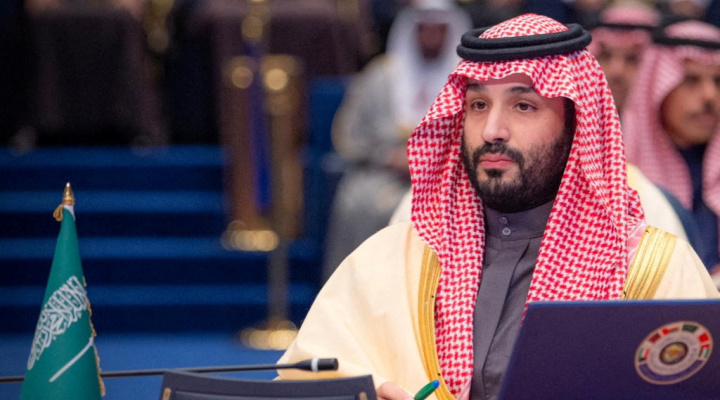Saudi Crown Prince Mohammed bin Salman attends the 45th Gulf Cooperation Council (GCC) Summit in Kuwait city, Kuwait, Dec. 1, 2024. Photo: Bandar Algaloud/Courtesy of Saudi Royal Court/Handout via REUTERS
In a recent statement, the Kingdom of Saudi Arabia condemned Israel with some of the strongest language it could muster.
The Kingdom declared Israel guilty of “crimes of genocide against defenseless civilians,” serious violations of “international law,” and a “threat to the legitimacy of the international order.”
This is a powerful denunciation, a seemingly righteous call for global accountability. It would be a morally compelling argument, if not for the fact that a separate, almost concurrent, report reveals the very same kingdom is actually engaged in these violations. The audacity is staggering, and the hypocrisy is impossible to ignore.
The Saudi condemnation positions the kingdom as a beacon of international justice, a defender of human rights and the rule of law. It speaks of the need to deter crimes and protect civilians. But just a day later, the United States Commission on International Religious Freedom (USCIRF) published a statement that directly challenges this self-appointed moral authority.
In it, the USCIRF condemns Saudi Arabia’s execution of Jalal Labbad, a young Shia Muslim, for the crime of protesting his government’s treatment of its own citizens.
This isn’t a one-off incident. It is part of a deliberate and systemic campaign of repression that has seen a dramatic increase in the use of the death penalty. Human Rights Watch and other organizations have reported an unprecedented surge, with at least 241 people executed as of August 2025. This disturbing rate is on track to surpass the record 345 executions of 2024, a year in which Saudi Arabia carried out an average of one execution every 25 hours. This escalating violence is a direct contradiction of the “Vision 2030” promises of a modern, tolerant society.
The details of these violations paint a damning picture. The Saudi justice system relies on vaguely worded laws and a broad interpretation of ta’zir (discretionary) punishment to execute people for non-lethal offenses. A significant majority of recent executions, approximately 70% in 2025, have been for non-violent drug-related crimes. These victims are disproportionately foreign nationals who are often denied legal counsel, translators, or consular support.
In fact, a staggering 75% of drug-related executions in 2024 involved foreigners, highlighting a profound bias in the application of the law.
Furthermore, the Saudi authorities who accuse Israel of aggression are themselves systematically targeting a religious minority within their own borders.
A recent Amnesty International report highlights that the Shia community, which makes up a small fraction of the total population, accounts for a disproportionate number of “terrorism”-related executions. The mass execution of 81 men in March 2022, for example, included 41 Shia Muslims. These men were convicted on charges stemming from peaceful protest.
Similarly, Jalal Labbad, a young Shia Muslim, was arrested and tortured for participating in peaceful protests in 2011 and 2012. He was advocating for the very rights and freedoms that his government now claims to be defending for the Palestinian people. The USCIRF report also reminds the world of other cases, including those of Youssef al-Manasif and Abdullah al-Derazi, who were minors at the time of their alleged crimes but have been sentenced to death.
Beyond the numbers, the human rights abuses extend to the fundamental workings of the justice system itself.
Human rights organizations have documented a widespread and systematic use of torture to extract confessions. Methods like beatings, electric shocks, and prolonged solitary confinement are used to coerce detainees into signing documents they have not read. In a stunning miscarriage of justice, judges routinely admit these coerced confessions as the sole basis for conviction, dismissing allegations of torture without investigation. This complete denial of due process and lack of judicial precedent makes the system a tool of political control, not of justice.
The anti-Israel condemnation from the Saudi government is not a genuine defense of Palestinian rights. Instead, it is a transparent attempt to deflect global scrutiny away from its own appalling human rights record. It is a cynical political maneuver, a well-timed performance designed to distract the world from its surge in executions, its persecution of religious minorities, and its continued use of torture and sham trials. The very country that preaches about violations of international law is the one most openly flaunting it. The world should not be fooled. Its condemnation rings hollow, a testament not to its moral conviction, but to its profound hypocrisy.
Amine Ayoub, a fellow at the Middle East Forum, is a policy analyst and writer based in Morocco. Follow him on X: @amineayoubx
Click this link for the original source of this article.
Author: Amine Ayoub
This content is courtesy of, and owned and copyrighted by, https://www.algemeiner.com and its author. This content is made available by use of the public RSS feed offered by the host site and is used for educational purposes only. If you are the author or represent the host site and would like this content removed now and in the future, please contact USSANews.com using the email address in the Contact page found in the website menu.





